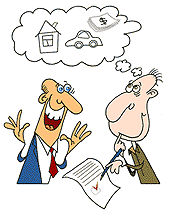Handling objections
Before I start talking about objections, I want you to take a minute or two and ask yourself the following question: “What is sales all about?”. In my opinion the right answer simply is “agreement”.
A sale does happen when there is a mutual agreement between you (the salesperson) and the prospect. You both agree that your product or service meets the prospects demands, you agree that the price is right and you agree to the fact that your firm seems trustworthy and can handle the deal.
What does this have to do with objections you might ask. A hole lot in fact! When your prospect comes up with an objection, what do you do? Do you tell him he is wrong? Lets say you get the classical “we think its too expensive” objection. In this case you could start pointing out that he is wrong, and try to convince him that the product infact is cheap. But maybe there is a better way…
Remember what I wrote earlier about agreement. You should at all times during the salesconversation build up agreement between you and the prospect. What if you instead answered the objection like this: “I see what you mean. To be honest with you, I think the price is pretty high myself. We could have made it a lot cheaper, but we know it simply would’t have met the standards and quality you require. Wouldn’t you agree that its better to buy a product that lasts for years and years to a slightly higher price, than having to replace it every other year because of it’s low quality?”.
In this example I start off by saying that I agree with his objection. Notice how that last sentence actually turns the objection into a positive question. Most likely he will agree to what youre saying and your one step closer to getting that sale.
Make a list of all the objections you usually face. For each of them find good, positive replies and take some time to learn them by heart.
Happy selling!



2 comments
I couldn’t agree more! This is almost the same method I use, besides asking a question at the end. Will try it.
What do you mean by asking a question at the end? Does that inspire a positive reaction in the client?
Leave a comment